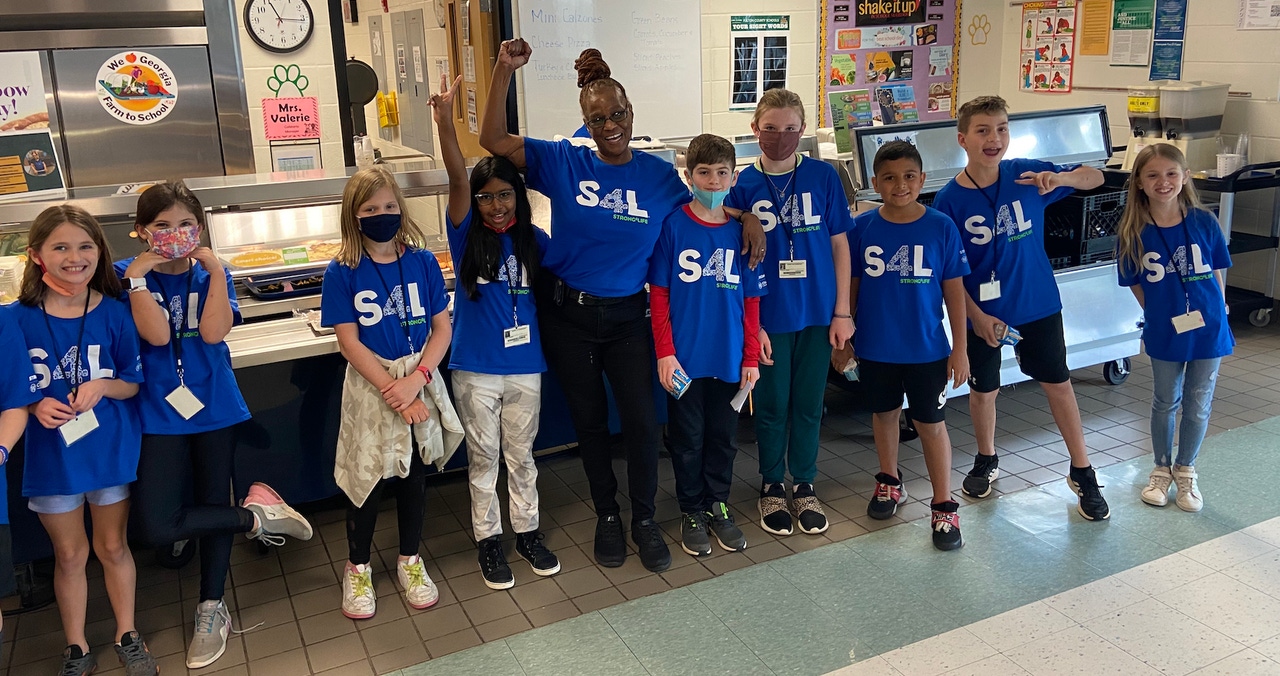
These innovative eateries are ones to watch.
Serving a large district while focusing on individual students in need
With an area of about 70 miles, Fulton County Schools has "quite a variety of students we’re trying to cater to,” says Executive Director of School Nutrition Alyssia Wright.
March 16, 2022

For Alyssia Wright, executive director of school nutrition for Fulton County Schools in Georgia, this job is personal.
She’s working in the district where she herself attended school with classmates who remain friends today. Her mother also worked at Fulton County Schools as a media specialist and introduced Wright to what turned out to be her calling.
It’s personal in another way, too. Even as Wright leads the fourth-largest district in the state, with 108 schools and 76,000 meals served daily, she finds a way to connect with individual students in need.
“With a [geographic area covering] 70 miles, we have quite a variety of students we’re trying to cater to,” Wright says. “We have everything from 31 schools on 100% free or reduced serve, to schools with 0.3%. When some students leave Friday, that’s the last full meal they have until Monday. And that’s how my work became my passion.”
Seeing the bigger picture
While working as a supervisor at a high school earlier in her 23-year career at Fulton County, Wright walked into the cafeteria after breakfast one day and saw a student surreptitiously going through the trash can at the far end of the room. She walked over and gently asked what was going on.
“He was standoffish at first—we hadn’t met officially, and I get confused all the time for one of the students because I’m only 5 feet tall,” Wright says. “But I’m persistent, and I introduced myself and said I was here to help. He explained he took the fruit thrown away after breakfast to take home to his siblings because his parents weren’t home. It crushed my heart.”
Wright took all the money in her purse and bought more food for the student, and later that day, shared the situation with school leaders and counselors to provide the family with support. But she recognized he wasn’t the only child struggling.
“This student saw it as his duty to provide for his siblings, and I thought, that truly tells me we have a need here in Fulton—because, of course, his siblings were in our schools, too,” Wright says. “It really became clear to me: My community needs our help. It was at that point that I became extremely dedicated.”
Photo courtesy of Fulton County Schools
That dedication extends to all of Fulton County Schools’ students. Whether they’re in need or not, Wright constantly reminds her staff that she doesn’t want students to receive a meal just for the sake of receiving a meal. They need high-quality food not just for the nutrition but because they deserve respect.
“They know that whether your school is 100% free or reduced or 0.3% free and reduced, the quality of meal that you serve our students is critical,” Wright says. “I do not want burned pizza or overcooked broccoli. My staff knows if that vegetable is not bright green, or the cheese is blackened, we have a problem. I will pull it out of the line and throw it away.”
Keeping choice top of mind
Fulton County students have multiple menu options to choose from each day, another passion point for Wright and her staff. Melissa Van Norden, the district’s coordinator of menus and wellness, is charged with creating at least three daily entrees at the elementary schools, about eight at the middle schools and up to 11 at the high school level.
“My own philosophy is the more options you have, the more likely you're able to appeal to most of the students,” Van Norden says. “I was a very picky eater growing up, so when there was only one option, a lot of times that meant I was bringing my lunch box. So for me, it’s about balancing that variety while also providing options for students who can’t bring a lunch—or might bring something that’s not nutritionally complete.”
Van Norden, Wright and the team stay in close touch with students, asking them not only what they’re enjoying in the cafeteria but also outside the school grounds. Sometimes, that inspires menu items like spicy chicken sandwiches; other times, it gets Wright thinking about options like food trucks, which she hopes to bring to campus in the coming year.
“It’s a lot of kids and personalities and backgrounds, and I love the challenge of trying to figure out how we’re going to make something work,” Van Norden says.
Apple kale salad/photo courtesy of Fulton County Schools
That part of the job has become more difficult in recent months, as Fulton County is feeling the supply crunch that continues to afflict virtually all operations. Van Norden agrees it’s challenging, of course, when more than 50 items are missing from an order.
But she’s taken a proactive approach, and it’s one from which she thinks other operators could benefit: She tracks the out-of-stock items lists she receives from the distributor on a weekly basis, trying to figure out patterns and trends over time to make better purchasing decisions.
“If we find, for example, that five out of the last seven weeks this item has been out of stock, we may need to look at replacing this on the menu with something that we can get more reliably,” Van Norden says. “Then I can reach out to the vendor and say, I noticed this isn't coming in consistently right now. Do you think it will be coming back soon, or is it temporarily or forever suspended?”
Sometimes, she says, a vendor is befuddled when Van Norden says a distributor hasn’t supplied a given item in some time. That’s when she’ll report back to the distributor and let them know the two parties need to talk.
It’s a process that takes time and effort, but that’s never deterred the team at Fulton County Schools.
“You really have to have a passion for this work for it to be rewarding, and our team sure does,” says Wright. “It's not always because of the money or the schedule, but because you're giving back to students. That's what drove me to this work, and I really try to make sure that vision is communicated outward.”
Get to know Fulton County Schools’ Alyssia Wright
See what’s in store for Wright’s operation, which was named FSD’s March Foodservice Operation of the Month.
Q: What makes your operation excel?
I have the best team—and it goes beyond us to the broader team. Our central office team, our supervisors, our coordinators, our support staff all have a shared vision. And I will say having them go out to the schools and work [during the pandemic] gave them a different appreciation for what our food service staffers and managers do every day.
So now their dedication and appreciation has superseded what ever thought it would be. It’s “Oh, you need something, this, that? Fine! Whatever you need to be successful!” Even more so now, they’re cherishing the [foodservice] staff and understanding that they don't have to work here. They choose to work here, and they want to be here every day for the students.

Alyssia Wright
Q: What are your goals for the operation in the coming year?
I’m looking at food trucks to bring to our students. Right now, kids are of the mindset that they want to leave campus and go to [restaurants]. So we’re thinking, OK, guess what? We’ll bring a mobile truck to you that will give you different choices and a different experience right here at school.
It’s about being open to things that are happening—the trends that our students are paying attention to. We do that by talking with our students. We normally bring in kids from around the district and have them taste test the recipes every year, and it’s a lot of fun. But through COVID, we’ve had to make that more local. So we’re looking forward to continuing to find ways to connect with our students.
Moving forward, I also want to work on strengthening our team even more. Retention will be a big focus: urging growth and development, and creating a pipeline for managers to grow into other positions. We do have a manager intern program, where foodservice workers can work to become a manager of their own school, and then we have a pipeline for managers to become supervisors and other positions as well. I really want to keep creating that kind of opportunity for growth.




